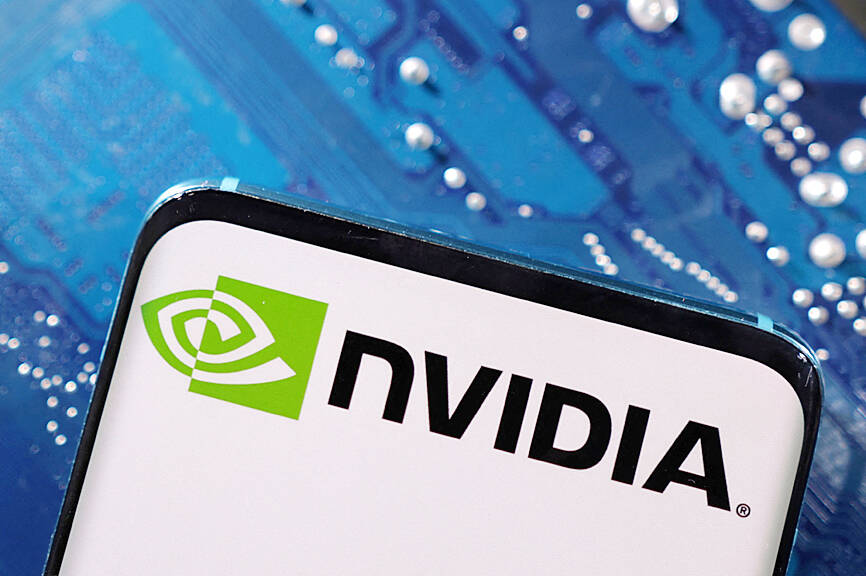Nvidia Corp is replacing Intel Corp on the Dow Jones Industrial Average, ending a 25-year-run for a pioneering semiconductor company that has fallen behind as Nvidia cornered the market for chips that run artificial intelligence (AI) systems.
Paintmaker Sherwin-Williams Co is also to replace chemical company Dow Inc among the companies that make up the 30-stock average.
The changes that take effect on Thursday “were initiated to ensure a more representative exposure to the semiconductors industry and the materials sector respectively,” S&P Dow Jones Indices LLC said on Friday.

Photo: Reuters
As the Dow Jones Industrial Average is price-weighted, “persistently lower priced stocks have a minimal impact,” it added.
Dow Inc — a major producer of chemicals and plastics, and unrelated to the similarly named company behind the index — has also been the smallest company on the Dow Jones Industrial Average in terms of market capitalization.
Intel’s share price has dropped 54 percent so far this year to US$23.20, making the company the worst performer on the index. The California chipmaker on Thursday reported third-quarter revenue of US$13.3 billion, down 6 percent from the same period last year.
The company is “acting with urgency” on a plan to reduce costs and simplify its portfolio, Intel chief executive officer Pat Gelsinger said at the time.
Analysts expect Intel to report its first annual net loss this year since 1986.
“Losing the status of Dow Jones inclusion would be another reputational blow for Intel, as it grapples with a painful transformation and loss of confidence,” said Susannah Streeter, head of money and markets at Hargreaves Lansdown.
“It would also mean that Intel is not included in exchange-traded funds which track the index, which could impact the share price further,” she added.
By contrast, Nvidia’s shares have risen more than 173 percent this year to US$135.40. The company is sitting at a US$3.32 trillion valuation, making it the world’s second-most valuable company.
Unlike Intel, Nvidia designs, but does not manufacture its own chips, relying heavily on Taiwan Semiconductor Manufacturing Co (台積電), an Intel rival.
The company has emerged as a cornerstone of the global semiconductor industry, thanks to the essential role its chips play in powering generative AI technologies.
Additional reporting by Reuters

AI BOOST: Although Taiwan’s reliance on Chinese rare earth elements is limited, it could face indirect impacts from supply issues and price volatility, an economist said DBS Bank Ltd (星展銀行) has sharply raised its forecast for Taiwan’s economic growth this year to 5.6 percent, citing stronger-than-expected exports and investment linked to artificial intelligence (AI), as it said that the current momentum could peak soon. The acceleration of the global AI race has fueled a surge in Taiwan’s AI-related capital spending and exports of information and communications technology (ICT) products, which have been key drivers of growth this year. “We have revised our GDP forecast for Taiwan upward to 5.6 percent from 4 percent, an upgrade that mainly reflects stronger-than-expected AI-related exports and investment in the third

Mercuries Life Insurance Co (三商美邦人壽) shares surged to a seven-month high this week after local media reported that E.Sun Financial Holding Co (玉山金控) had outbid CTBC Financial Holding Co (中信金控) in the financially strained insurer’s ongoing sale process. Shares of the mid-sized life insurer climbed 5.8 percent this week to NT$6.72, extending a nearly 18 percent rally over the past month, as investors bet on the likelihood of an impending takeover. The final round of bidding closed on Thursday, marking a critical step in the 32-year-old insurer’s search for a buyer after years of struggling to meet capital adequacy requirements. Local media reports

TECHNOLOGICAL RIVALRY: The artificial intelligence chip competition among multiple players would likely intensify over the next two years, a Quanta official said Quanta Computer Inc (廣達), which makes servers and laptops on a contract basis, yesterday said its shipments of artificial intelligence (AI) servers powered by Nvidia Corp’s GB300 chips have increased steadily since last month, should surpass those of the GB200 models this quarter. The production of GB300 servers has gone much more smoothly than that of the GB200, with shipments projected to increase sharply next month, Quanta executive vice president Mike Yang (楊麒令) said on the sidelines of a technology forum in Taipei. While orders for GB200 servers gradually decrease, the production transition between the two server models has been

ASE Technology Holding Co (日月光投控), the world’s largest integrated circuit (IC) packaging and testing supplier, yesterday announced a strategic collaboration with Analog Devices Inc (ADI), coupled with the signing of a binding memorandum of understanding. Under the agreement, ASE intends to purchase 100 percent shares of Analog Devices Sdn Bhd and acquire its manufacturing facility in Penang, Malaysia, a press release showed. The ADI Penang facility is located in the prime industrial hub of Bayan Lepas, with an area of over 680,000 square feet, it said. In addition, the two sides intend to enter into a long-term supply agreement for ASE to